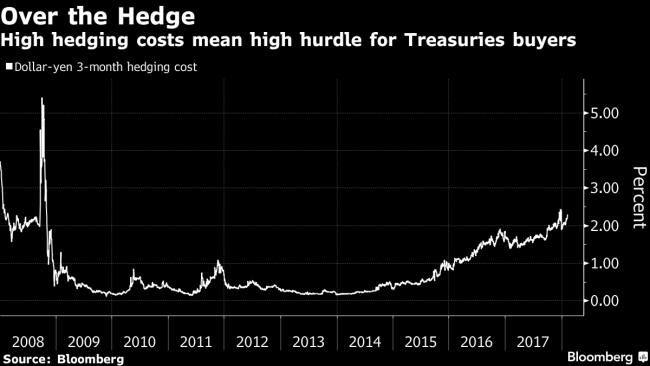(Bloomberg) -- U.S. Treasury yields may be a lot higher than can be found in Japan, but Japanese investors beset by a strengthening currency are looking for some additional inducements before ramping up their purchases.
First off, potential buyers want to hear from newly installed Federal Reserve Chairman Jerome Powell, who’s scheduled to testify on the economy at Congress Feb. 28. After stronger-than-anticipated U.S. wage and inflation data in recent weeks, the key questions are what’s his take on the outlook for monetary tightening, and what does he make of the jump of almost a percentage point in the 10-year yield since September.
"Investors will be reluctant to take positions until Fed Chairman Powell’s testimony,” said Kenta Inoue, a senior market economist at Mitsubishi UFJ Morgan Stanley (NYSE:MS) Securities Co. in Tokyo. "There is a vague concern about how the Fed would communicate with the market under the new leadership."
Recent data back up that hypothesis:
- Japanese investors sold a net 973.2 billion yen ($9.2 billion) in overseas bonds and notes in the week ended Feb. 9, data from the Ministry of Finance showed Friday
- A separate set of figures released by the Treasury Department in Washington on Thursday showed Japan’s holdings of U.S. Treasuries fell for the fifth straight month in December, to $1.06 trillion, from $1.09 trillion at the end of 2016. That’s even as holdings by China increased last year by the most since 2010.
The speed of the recent move up in U.S. yields has caught many by surprise. And accompanied by a tumble in the dollar that’s made it more costly for Japanese investors to hedge foreign-exchange risks, it’s raised the bar for Japan-based buyers. The yen has climbed 6.6 percent this year. It strengthened past the 106-per dollar level on Friday for the first time since November 2016, and was up 0.4 percent at 105.70 as of 2:06 p.m. in Tokyo.
The question for Japan-based investors is "how do you balance the attractive yield with the cost of hedging if you expect the dollar to weaken," said Jean Medecin, a member of the investment committee at French asset manager Carmignac Gestion SA.
The 10-year Treasury yield probably needs to hit at least 3 percent to spur the appetite of Japanese funds, a number of market participants said.
"Japanese investors are expected to buy if the 10-year bond yield rises to 3 percent and markets stabilize after the recent selloff in global shares," said Jun Kato, chief market analyst at Shinkin Asset Management Co. in Tokyo.
Shuichi Ohsaki, chief rates strategist for Japan at Bank of America Merrill Lynch, had much the same take, while adding that some investors may want to hold off further, until the Japanese financial year begins on April 1.
Before that comes Powell’s testimony in what’s referred to as Humphrey-Hawkins hearings at House and Senate committees, followed by the Federal Reserve’s March 20-21 policy meeting that includes a press conference with the chairman.
Given the danger that Trump administration’s fiscal policies pose for bond yields, investors will be watching whether Powell can convince that inflation and market volatility are under control, Kato at Shinkin said.

